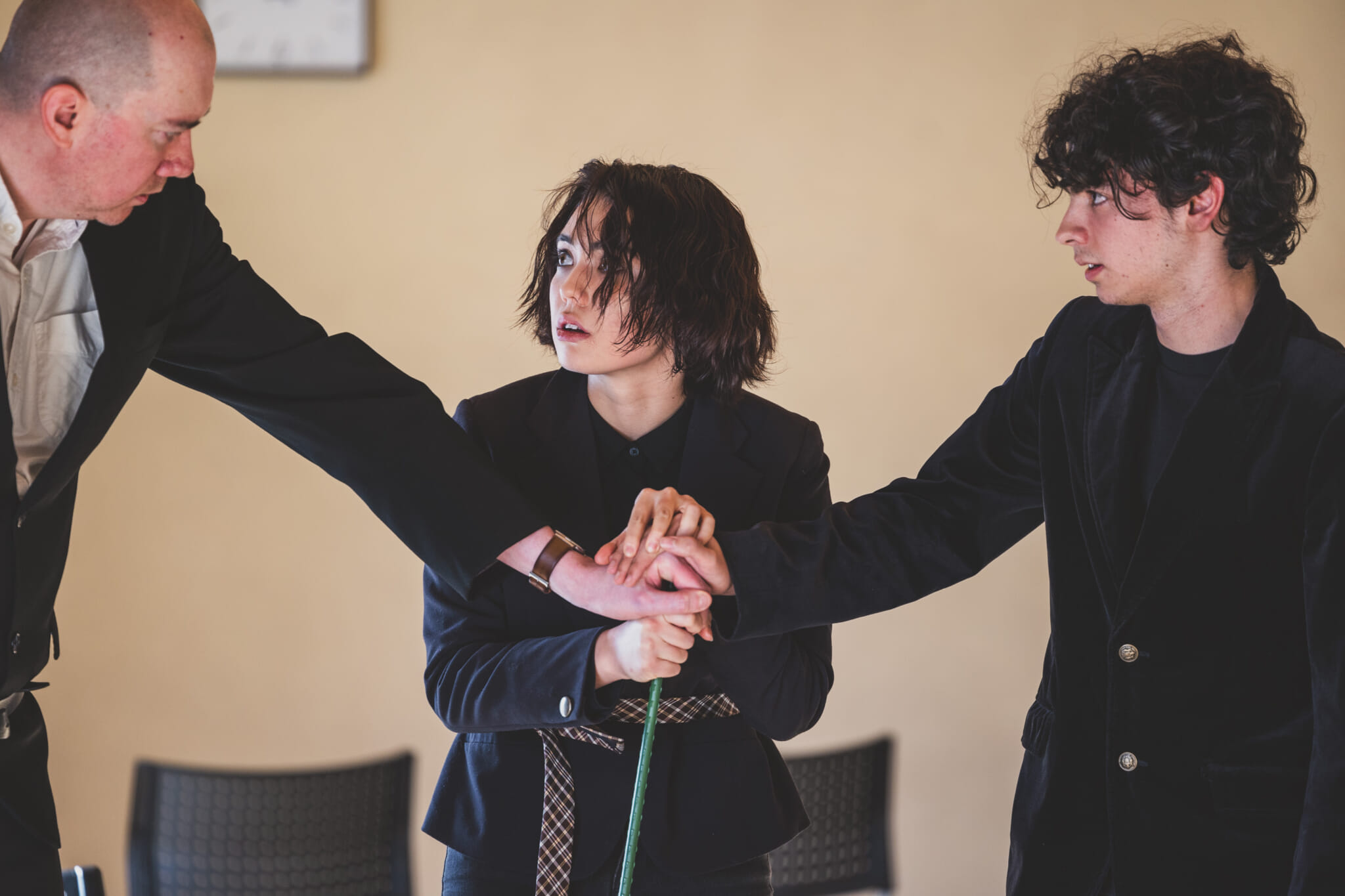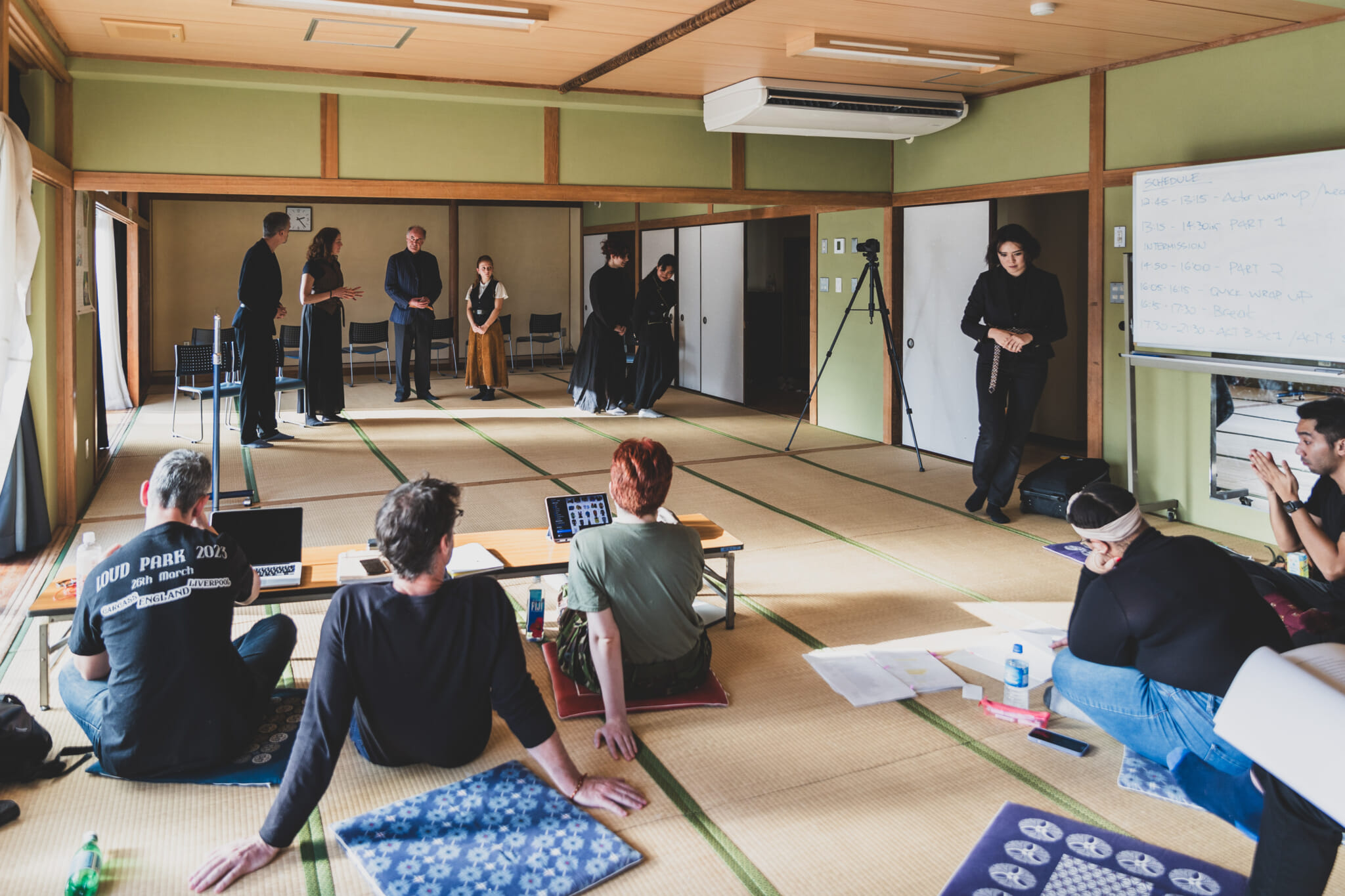As many entertainment options as Japan has, it’s certainly more difficult to find great English theater here compared to English-speaking countries. That’s why we at Tokyo Weekender are so excited for Sheepdog Theatre and its production of Hamlet which is playing in the capital this February. Established in 2019 but forced into a hiatus due to the COVID-19 pandemic, this show will be its third production. Quickly building prominence, Sheepdog Theatre’s Hamlet is its biggest undertaking yet, and promises to be an exciting show for theater enthusiasts based in Japan. In an exclusive interview with Sheepdog Theatre’s artistic director, Michael Walker, and the actor undertaking the titular role, Misa Ogawa, we discussed the backstory and highlights of the production, and what’s ahead for the theater company.
A Fateful Meeting
Last year, having just wrapped a successful production of Samuel D. Hunter’s The Whale, Walker was in search of his next big project. By fate, he attended a production of Romeo and Juliet that was being put on by the Sophia Shakespeare Club. What he didn’t expect was to be blown away by the show, specifically by the director and actor portraying Romeo, who happened to be Ogawa. “He was just mind-blowingly amazing. I was like, where am I?” Walker recounts. “After the show, I greeted Misa in the foyer and suggested meeting up for a chat. When we sat down to talk later, I asked him, ‘what’s your dream role?’” and he replied: Hamlet. Just when he said that, everything seemed to click, and I knew what my next project would be.”
Nodding along, Ogawa concurs. “I never imagined what a large production this would become, and I feel so blessed to have met Michael.”

Taking on Shakespeare Through the Lens of Transgenderism
As one of the most famous plays ever written, taking on Hamlet certainly is a large undertaking. Ogawa is no newbie in the film and theater world, receiving the Kinemaster award at the Tanabe-Benkei Film Festival at only 19 for directing his film Gishin. Despite his extensive experience in directing and acting, however, he struggled to grasp Hamlet’s character initially.
“At first, I made the mistake of approaching Hamlet like I would any other character, which is watching all the famous versions and obsessing over the text. I was approaching him like he was something solvable, and I wasn’t allowing him to be fully human. The brilliance of Hamlet is that he is messy and ridiculous and illogical. He’s theater’s problem child, because he’s as unapologetically human as we are. In Hamlet’s own words, ‘to know a man well, were to know himself.’ What I really had to do was to step back and be him.”
As a trans actor, Ogawa divulged his distinctive insight and understanding of Hamlet. “Introducing an element of transgenderism brings a pop of color into the role in an area that is usually pretty unexplored. Hamlet is a character who is as conflicted and uncomfortable in his own gender identity as he is in other aspects of his life,” Ogawa explains. “From his first outburst of ‘frailty, thy name is woman,’ to when he compares his superstitions to something womanly in the final scene, he spends the entire play seeing himself as a woman more than a man, and it’s clear he doesn’t like that. He forces himself into this simulacrum of ideal masculinity that doesn’t exist. But when Hamlet speaks to us in the audience we slowly start to see the cracks in that and we see a Hamlet that’s closer to ourselves. It’s an honor to portray him in that way, and it helps me bring my truth to the character.”
Having acted in Japan since he was 11, Ogawa also finds this production of Hamlet refreshing due to his ability to express his gender more openly. “The general consensus that Japan seems to have is that LGBTQ+ people are innocuous but unseemingly bothersome. There’s a sense of hesitant acceptance you get, it feels like they’re saying ‘we’ll allow it,’ and it’s like, allow what? My existence? Transgender actors in Japan either have to live openly and face that discrimination and find roles within that, or fade away into the gender role that’s expected of them. And I think that’s what most of them choose, because the facade of conformity at the expense of identity is a cultural expectation.”
It’s clear Ogawa has lived through this unaccepting environment throughout his 16 years of acting. “I only get female roles unless I’m directing,” he says, “I never even try to say that I’m transgender outside of western spaces where I know it’s permitted. A large part of playing Hamlet as a transgender actor has been confronting that fear, and reexamining my own views of masculinity and transphobia. Ironically, studying this character helps me get past my apprehensions of who I am, and my struggles to be seen as myself bleeds into the Hamlet I am on stage.”

Constructing the World of Hamlet
Ogawa and Walker are clearly talented and knowledgeable about what they do, but they boast about the entire cast who make the story come to life. “What makes this show unique is that it’s 11 actors on stage bringing their own, unique, powerful truths to the beauty of Shakespeare’s language,” Walker says.
In terms of the costume and set design, they’ve incorporated a twist on the classic. “The costumes are anchored in a Renaissance base, but it’s colored with 50s and 60s design,” Walker explains, “I wanted to look at the divide between the older generation and the younger generation. The older generation has that more conservative, post-war strictness, and the younger generation are more in the 60s, dressing more freely.” In contrast, the set reflects Denmark’s stony cityscape. “We have a brutalist set that’s gray, muted and rigid, that reflects the world of Hamlet. But we also have some falling fabric to incorporate softness. Because we have really interesting and colorful costumes, we didn’t want that to clash with the set.”
A Theater Troupe Building a Global Community
Though Hamlet will be performed in Japan, Walker emphasizes that their production could be put up anywhere. “We’re just trying to put on a show we’re proud of. Not because it’s a Tokyo show or a Japan show, but one that would stand up as a quality show anywhere. Obviously the logistics and practicalities are different in Japan, but in terms of the work itself, I’m catering to the integrity of the production.”
If you are interested in English-language theater but feel intimidated by Shakespearean speech, Walker and Ogawa emphasize that this is certainly not a reason for concern.
“We will have a detailed synopsis in Japanese on a digital program at the theater,” Walker says, “and even if you don’t know Shakespeare that well, it will still impact you. One of the things we worked really hard on is making sure there’s clarity in the relationships. Even if you may not be able to follow every word, you’ll understand what’s going on and the dynamics of the characters.”
“I would say don’t be scared of it,” Ogawa adds. “We see art not to understand it but to feel it. The love, grief and struggles of Hamlet are enough to transcend barriers of language.”
For those looking to get involved in theater here in Tokyo, Walker reaches out a warm welcome. “Follow us on social media and join our mailing list! We announce auditions there, and we’re always looking for people that are not necessarily experienced, but passionate and committed, and understand that this is a collaborative process.”
Sheepdog Theatre’s production of Hamlet runs from February 14 to February 18. Purchase tickets here.









